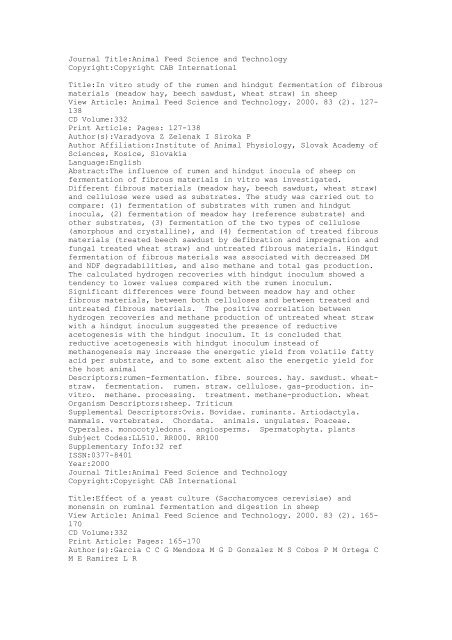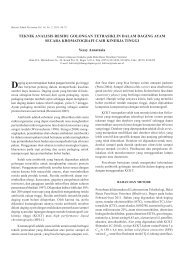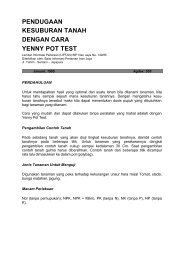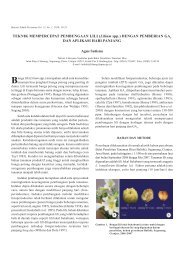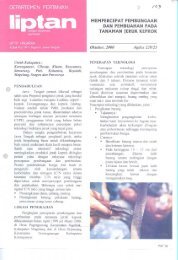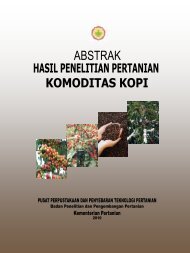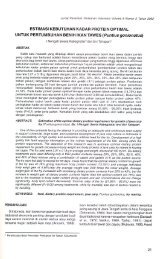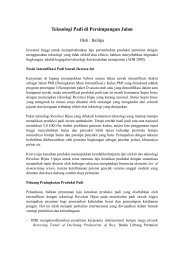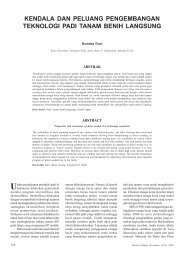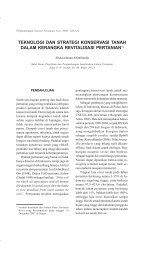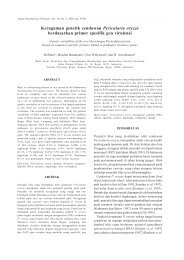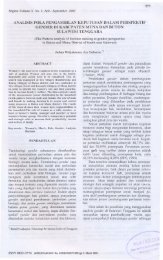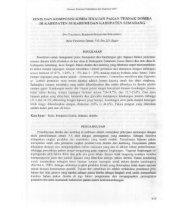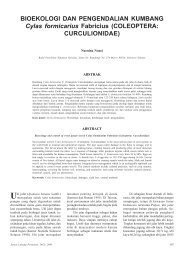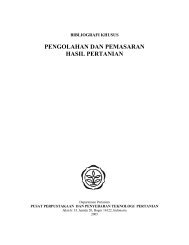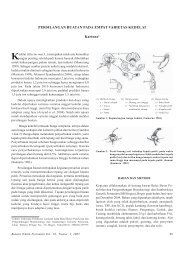Komoditas : KAMBING - Pustaka
Komoditas : KAMBING - Pustaka
Komoditas : KAMBING - Pustaka
Create successful ePaper yourself
Turn your PDF publications into a flip-book with our unique Google optimized e-Paper software.
Journal Title:Animal Feed Science and Technology<br />
Copyright:Copyright CAB International<br />
Title:In vitro study of the rumen and hindgut fermentation of fibrous<br />
materials (meadow hay, beech sawdust, wheat straw) in sheep<br />
View Article: Animal Feed Science and Technology. 2000. 83 (2). 127-<br />
138<br />
CD Volume:332<br />
Print Article: Pages: 127-138<br />
Author(s):Varadyova Z Zelenak I Siroka P<br />
Author Affiliation:Institute of Animal Physiology, Slovak Academy of<br />
Sciences, Kosice, Slovakia<br />
Language:English<br />
Abstract:The influence of rumen and hindgut inocula of sheep on<br />
fermentation of fibrous materials in vitro was investigated.<br />
Different fibrous materials (meadow hay, beech sawdust, wheat straw)<br />
and cellulose were used as substrates. The study was carried out to<br />
compare: (1) fermentation of substrates with rumen and hindgut<br />
inocula, (2) fermentation of meadow hay (reference substrate) and<br />
other substrates, (3) fermentation of the two types of cellulose<br />
(amorphous and crystalline), and (4) fermentation of treated fibrous<br />
materials (treated beech sawdust by defibration and impregnation and<br />
fungal treated wheat straw) and untreated fibrous materials. Hindgut<br />
fermentation of fibrous materials was associated with decreased DM<br />
and NDF degradabilities, and also methane and total gas production.<br />
The calculated hydrogen recoveries with hindgut inoculum showed a<br />
tendency to lower values compared with the rumen inoculum.<br />
Significant differences were found between meadow hay and other<br />
fibrous materials, between both celluloses and between treated and<br />
untreated fibrous materials. The positive correlation between<br />
hydrogen recoveries and methane production of untreated wheat straw<br />
with a hindgut inoculum suggested the presence of reductive<br />
acetogenesis with the hindgut inoculum. It is concluded that<br />
reductive acetogenesis with hindgut inoculum instead of<br />
methanogenesis may increase the energetic yield from volatile fatty<br />
acid per substrate, and to some extent also the energetic yield for<br />
the host animal<br />
Descriptors:rumen-fermentation. fibre. sources. hay. sawdust. wheatstraw.<br />
fermentation. rumen. straw. cellulose. gas-production. invitro.<br />
methane. processing. treatment. methane-production. wheat<br />
Organism Descriptors:sheep. Triticum<br />
Supplemental Descriptors:Ovis. Bovidae. ruminants. Artiodactyla.<br />
mammals. vertebrates. Chordata. animals. ungulates. Poaceae.<br />
Cyperales. monocotyledons. angiosperms. Spermatophyta. plants<br />
Subject Codes:LL510. RR000. RR100<br />
Supplementary Info:32 ref<br />
ISSN:0377-8401<br />
Year:2000<br />
Journal Title:Animal Feed Science and Technology<br />
Copyright:Copyright CAB International<br />
Title:Effect of a yeast culture (Saccharomyces cerevisiae) and<br />
monensin on ruminal fermentation and digestion in sheep<br />
View Article: Animal Feed Science and Technology. 2000. 83 (2). 165-<br />
170<br />
CD Volume:332<br />
Print Article: Pages: 165-170<br />
Author(s):Garcia C C G Mendoza M G D Gonzalez M S Cobos P M Ortega C<br />
M E Ramirez L R


